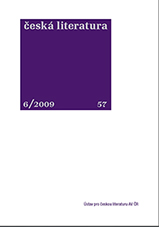Romantická imaginace: příroda a krajina v obrozenském cestopise
The Romantic Imagination: Nature and Landscape in Revivalist Travel Writing
Author(s): Veronika FaktorováSubject(s): Literary Texts
Published by: AV ČR - Akademie věd České republiky - Ústav pro českou literaturu
Keywords: Romanticism; Czech National Revival; travel writing
Summary/Abstract: The article is concerned with the phenomenon of the Romantic imagination in the literature of the Czech National Revival. The introductory section recalls the European context of travel writing, which often brought together erudite scholarly interpretation and effective poetic imagery, particularly in works by Alexander Humboldt (1769–1859), Johann Baptist von Spix (1781–1826), Maximilian zu Wied Neuwied (1782–1867), and Christian Gottfried Ehrenberg (1795–1876), and demonstrates the way in which they sought to shape nature aesthetically. The author points to the characteristic use of figurative speech, which is evident also in Czech travel writing, for example, in works by Josef Myslimír Ludvík (1796–1856) and Matěj Milota Zdirad Polák (1788–1856). The tendency towards fresh, strongly figurative linguistic expression, according to the author, aimed to intensify the aesthetic perception of the picture of the landscape and add a special semantic haziness to the text. In contemporaneous travel writing Nature consistently referred to the situation of the subject, becoming a symbol of what was going on inside him or her. By using certain literary devices, travel writing turned a nonfiction text into an aesthetically motivated work, primarily intended for artistic communication. The second part of the article compares the representation of Nature in the works of Karel Hynek Mácha (1810–1836) with the artistic approaches and devices characteristic of Revivalist travel writing. The article seeks to demonstrate that, in addition to a similar repertoire of poeticizing linguistic devices, Mácha’s works resemble Revivalist travel writing also with respect to the configuration of the landscape. The author develops the thesis of Felix Vodička (1909–1974), according to which Mácha’s work must be seen in the context of previous Revivalist literature, but not only its prestigious works like the Forged Manuscripts, Kollár’s verse, and Josef Linda’s Záře nad pohanstvem (A Light over the Pagans), but also its genres of literary history, usually forgotten, including travel writing. In terms of language, Mácha’s works exhibit obvious parallels with Revivalist travel writing, but fundamentally differ from it in their thoroughly existential speculations. His landscape picture shows a close resemblance to the inner experience of the subject, but does not evoke only a certain emotional mood. Rather, it emphasizes the special nature of time. Mácha deepened and expanded the possibilities of the Romantic imagination and Czech Romantic language, which were present in some Revivalist works – original ones as well as translations – beginning in the 1820s.
Journal: Česká literatura
- Issue Year: 57/2009
- Issue No: 6
- Page Range: 817-835
- Page Count: 18
- Language: Czech

